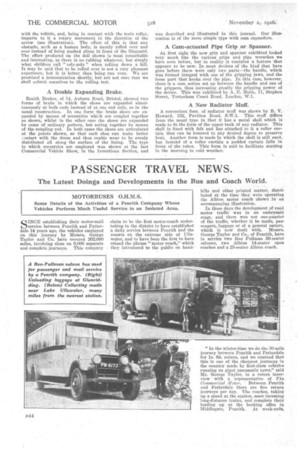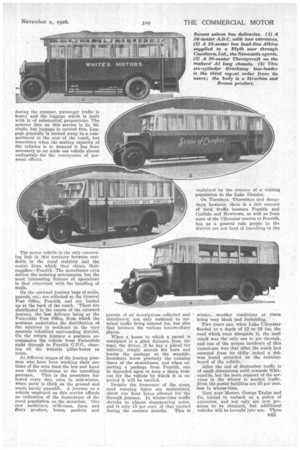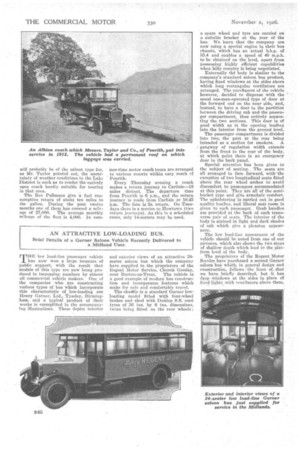PASSENGER TRAVEL NEWS.
Page 70

Page 71

Page 72

If you've noticed an error in this article please click here to report it so we can fix it.
The Latest Doings and Developments
in the Bus and Coach World,
INCE establishing their motor-mail Oservice between Penrith and Patterdale 14 years ago, the vehicles employed on this journey by Messrs. George Taylor and Co. have covered 262,080 miles, involving close on 9,000 separate and complete journeys. This company A Reo-Pullman saloon bus used for passenger and mail service by a Penrith company. (Bight) Unloading luggage at Glenridding. (Below) Collecting mails near Lake Ullswater, many miles from the nearest station. claim to be the first motor-coach undertaking in the district to have established a daily service between Penrith and the resorts on the extreme side of I.711swater, and to have been the first to have coined the phrase "motor coach," which they introduced to the public on hand bills and other printed matter, distributed at the time they were operating the Albion motor coach shown in an accompanying illustration.
In those days the development of road motor traffic was in an embryonic stage, and there was not one-quarter of the traffic, whether it be mails, passengers, luggage or of a general nature, which is now dealt with. Messrs. George Taylor and Co., of penrith, have in service two Reo Pullman 26-seater saloons, two Albion 14-seater open coaches and a 25-seater Albion coach.
"In the winter-time we do the 30-mile journey between Penrith and Patterdale for 1s. 6d. return, and we centend that this is one of the cheapest journeys in the country made by first-class vehicles running on giant pneumatic tyres," said Mr. George Taylor, in a recent interview with a representative of Tine Commereial If otor. Between Penrith and Patterdale there are five return journeys per day. The coaches, taking rip a stand at the station, meet incoming long-distance trains, and complete their loading up at the booking office in MiddIegate, Feudal. At week-ends,
during the summer, passenger traffic is heavy and the luggage which is dealt with is of substantial proportions. The summer fare on this service is 2s. 64. single, but luggage is carried free. Luggage generally is stowed away in a compartment at the rear of the coach. but sometimes when the seating capacity of the vehicles is in demand it has been necessary to set aside one vehicle almost exclusively for the conveyance of personal effects.
The motor vehicle is the only connecting fink in this territory between residents in the rural ristriets and the centre from which they obtain their supplies—Penrith. The motorbuses even deliver the morning newspapers, but the most interesting feature of operations is that concerned with the handling of mails.
On the outward journey bags of mails, parcels, etc., are collected at the General Post Office, Penrith, and are loaded up at the back of the coach. These are distributed in the course of the outward journey, the last delivery being at the Patterdale Post Office, from which the postman undertakes the distribution of the missives to residents in the very sparsely inhabited surrounding district. On the return journey a postman accompanies the vehicle from Patterdale right through to Penrith G.P.O., clearing all the wayside pillar-boxes en route.
At different stages of the journey postmen who have been working their sections of the area meet the bus and hand over their collections to the travelling
postman. This is the procedure followed every day, even in mid-winter, when snow is thick on the ground and roads barely passable. A journey on a vehicle employed on this service affords an indication of the dependence of the rural population on the motorbus. One saw medicines, milk-cans, farm and diary produce, boxes, packets and
parcels of all descriptions collected and distributed; not only terminal to terminal traffic being catered for, but also that between the various intermediary places.
When a house to which a parcel is consigned is a good distance from the road, the driver, if he has a pared for delivery, simply sounds his horn anti leaves the package at the wayside. Residents know precisely the running times of the motorbuses, and when expecting a package from Penrith, can be depended upon to keep a sharp lookout for the vehicle by which it is expected it will be carried.
Despite the frequency of the stops, good running times are maintained, about one hour being allowed for the through journey. In winter-time traffic shrinks to almost disappearing point, and is only 15 per cent. of that carried during the summer months. This is winter, weather conditions at times being very bleak and forbidding.
Two years ago, when Lake ElIswater flooded to a depth of 12 to 18 ins, the road which runs alongside it, the mail coach was the only one to get through, and one of the unique incidents of this experience was that after the coach had emerged from its chilly ordeal a fish was found stranded on the runningboard of the vehicle.
After the end of September traffic is of small dimensions until towards Whitsuntide, but the main support of the services in the winter is market traffic. Even the postal facilities are 50 per cent. less in winter-time,
Next year Messrs. George Taylor mid Co. intend to embark on a policy of extension, and not only are new premises to be obtained, but additional vehicles will be brought into use. These
will probably be of the saloon type for, as Mr. Taylor pointed out, the uncertainty of weather conditions in the Lake District is such as to render the entirely open coach hardly suitable for touring in that area.
The Reo Pullmans give a fuel consumption return of abolit ten miles to the gallon. During the past twelve months one of them has covered a mileage of 27,000.. The average monthly mileage of the fleet is 4,000. In sum
MBE low load-line passenger vehicle has now won a large measure of public support, with the result • that models of this type are now being produced in increasing numbers by almost all commercial vehicle makers. One of the companies who are constructing various types of bus which incorporate this characteristic of low-loading are Henry Garner, Ltd,, Tyseley, Birmingham, and a typical product of their works is exemplified in the accompanying illustrations. These depict interior mer-time motor coach tours are arranged to various resorts within easy reach cf Penrith.
Every Thursday evening a coach makes a return journey to Carlisle-1S miles distant. The departure time from Penrith is 6 p.m., and the return journey is made from Garb,Sle at 10.45 p.m. The fare is 3s. return. On Tuesdays there is a service to Howtown (two return journeys). As this is a scheduled route, only 14-seaters may be used.
and exterior views of an attractive 24seater saloon bus which the company have supplied to the prOprietors of the Regent Motor Service, Church Gresley, near Rurton-on-Trent. The vehicle is goad example of modern bus construction and incorporates features which make for safe and comfortable travel.
The cliaktis is a standard Garner lowloading model fitted wish four-wheel brakes and shod with Dunlop S.S. cord tyres of 36 ins. by 6 ins, dimensions, twins being fitted on the rear wheels ; a spare wheel and tyre are carried on a suitable bracket at the rear of the bus. We learn that the company are now using a special engine in their bus chassis, which has an actual b.b.p. of • 55.4 and enables a speed of 40 m.p.h. to be obtained on the level, apart from possessing highly efficient capabilities when hilly country is being negotiated.
Externally the body is similar to the ;company's standard saloon bus product, having fixed windows at the sides above which long rectangular ventilators are arranged. The purchasers of the vehicle however, decided to dispense with the usual one-man-operated type of door at the forward end On the near side, and, instead, to have a door in the partition between the driving cab and the passenger compartment, thus entirely separating the two sections. This door is of good width as is the opening leading into the interior from the ground level.
The passenger compartment is divided into two, the part at the rear being intended as a section for smokers. A I gangway of regulation width extends from the front to the rear of the body, at which point there is an emergency door in the back panel.
Special attention has been given to the subject of seating. The seats are all arranged to face forward, with the exception of two longitudinal scats fitted above the rear wheel arches to avoid discomfort to passengers accommodated at this point. They are all of the semibucket type and give armchair comfort. The upholstering is carried out in good quality leather, and liberal seat room is given to each passe/wen Grab handles are provided at the back of each transverse pair of seats. The interior of the body is stained in light and dark shades of oak which give a pleasing appearance.
The low load-line appearance of the vehicle should be noted from one of our pictures, which also shows the two steps of shallow depth which lead to the platform level of the body.
• The proprietors of the Regent Motor Service have purchased a second Garner saloon bus which, in general design and construction, follows the lines of that we have briefly described, but it has Irop windows at the sides in place of fixed lights with ventilators above them.




























































































































